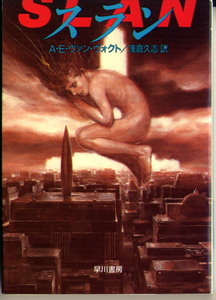So when I was at the library, the other book I was trying to find was The Hidden Family, which is the second half of the story started in The Family Trade. The library's online catalog said that they had two copies and that neither was checked out, but they weren't on the shelf, and I guess that means they were in shelving cart limbo. But where The Hidden Family should have been, there was Iron Sunrise, also by Charlie Stross. So I grabbed it.
Iron Sunrise is a sequel to Singularity Sky, which I'd read a few years ago. But it's a "set in the same world with some of the same characters" sequel, not a "book chopped in half" sequel*, so it was pretty easy to pick up and get up to speed on the background. Back from the first book is Rachel Mansour, a UN weapons inspector, but in a post-Singularity world where the UN is a freelance peace-keeping corporation and the weapons of mass destruction are capable of destroying suns. In fact, the book is something of a murder mystery, only the victim was an entire world. One of the survivors of that world's destruction is Wednesday, a goth teenager who has been secretly trained since childhood to be an agent of the "weakly godlike" AI entitywho lurks behind the scenes of the books, and who (Wednesday, not the Eschaton) is the other protaganist of Iron Sunrise. "Action-packed" would be a good hypenated word to describe the book. "Good" would be a good single word.

Slan by A. E. van Vogt is a science fiction classic that I had never read, and it had just come up in a blog post somewhere (that I can't remember where), and I happened to see it at the library. Far in the future, a mutated off-shoot of humanity lives under extreme persecution. These "slans" have enormous strength, incredible intelligence, and, using "tendrils" on the tops of their heads, can read minds. A young slan, Jommy Cross, is orphaned at age nine and struggles against the massed armies of the Earth.
I understand that it's a book that was very important to a lot of people because of its theme of persistence against persecution. In the 1950s sci-fi fan culture there was a saying "fans are slans". And an Amazon reviewer says:
I first read Slan in my early teens, and (this is going to get a little personal here, folks) I really identified with the struggle against persecution because at the time I was an adolescent struggling with my own sexuality and the realization that I am gay - something that in my youth (and to a *slightly* lesser extent today) was something to hide, something to fear, lest you suffer persecution.
I re-read the book along with a few other Van Vogt novels as an adult, and it still gave me that feeling of empowerment - that being different was not necessarily "bad."
So, yay, and it's an important part of sci-fi history, but it was really hard for me to read as anything but a historical document. The science-fiction-guesses-that-turned-out-to-be-wrong I don't mind so much. At some level all science fiction is just make-em-ups, fantasy with robots instead of goblins**. And the lack of actual plot or the resolution thereof, I can live with(out). But it's the dialogue. It manages to be melodramtic and stiff at the exact same time. Drove. Me. Crazy.
An overview of A.E. van Vogt's career
A collection of Slan covers
* Sorry I keep harping on this, but the whole concept continues to cheese me off. Especially since I still don't know what happens in The Hidden Family.
** Oh, don't start flaming me for this -- I can argue the other way myself, far into the night.
tricia
You REALLY ought to read the three Midnighters books. The third one just came out this week and yes, I have ordered it. They are so enjoyable. Just a suggestion!!!!